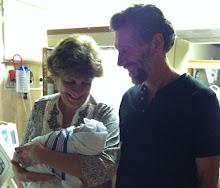"Rags make paper,
Paper makes money,
Money makes banks,
Banks make loans,
Loans make beggars,
Beggars make rags."
Someone told me that the heart of the consumer is a heart that cannot love others. It reminded me of the story about Bernard Madoff. Here is a man who swindled the people he was closest to in the world, not just friends but family too. And I think the reason he could do so has to do with a sense of entitlement that comes from not recognizing that, truly, we own nothing, are entitled to nothing, and that whatever comes to us is a gift and a loan.
So I guess it is not so odd that the money maker is now making rags (or the prison equivalent of such). Wanting to own the world (or at least the money of all he knew and cared for) was the trap that led to his own demise. And he was so shameless in the flaunting of that money. Yachts and clothes and parties and all the things essential to the "good life." How does one fall from the pinnacle of consumerism to the pit? And was he driven by a lust for goods, or a desire to have one over on others, or was he just some dumb schmuck trying to get whatever he could before the party ended. Living each day as if it was his last because he knew that at any moment the jig could be up.
The point of the rag story, according to Sister Joan Chittister, is "be careful what you want. It will own you before you own it." And how clearly we can see that in the face of Bernard Madoff. But what of our own wants - the things we silently dream about, or pursue with a vengeance. How much of our own being is no longer ours but belongs to the stuff we accumulate, store, and covet.
As a child I learned the 10 commandments. I was always puzzled by that word "covet". What did that mean I wondered as it was being explained that I should not "want" my neighbors stuff even if it was better than mine or "desire" my neighbor's spouse no matter how much I might dislike my own or be attracted to hers. Is it the nature of human nature to want what we don't have - was the reason for the law that God recognized this basic flaw in our nature? And in the good nun's words - is the danger in possession being possessed?
Ownership, the basic assumption of the capitalist economy - do we possess or are we possessed? Is the engine of the economy the engine of our own destruction or are we above those laws laid down thousands of years ago in some primitive tale that might be the word of God or, for others, a long ago tale passed on by man? Of course in late 2009 we are more able to see the pitfalls in our economic system, to recognize that greed does indeed lead to destruction. And whether God is the source of this wisdom or man long ago understood this on some level, it is easier to see now how coveting may indeed close our hearts to the other. And ignoring our history we are indeed doomed to repeat it and have done so, over and over, for the length of recorded human history.
My mother loved things, she surrounded herself with lovely objects that she took great pride in. Her home was filled with art and beauty. In her last days, though, she lay in a bed in a tiny room in a private home, racked with pain and gasping for each breath. The home was one she would not have sought to live in, the bed tiny and lumpy. But the people there cared for her with love and compassion and ushered her out of this world with grace. The beauty lay in that grace, not in the surroundings but in the people. I wonder, belatedly, if she would have traded all those beautiful things for that grace and love. I believe so. I hope so. Today, some of those lovely things she cared for are in my care. I see them as a reminder to let go of what is not important.
Friday, October 16, 2009
Subscribe to:
Comments (Atom)
